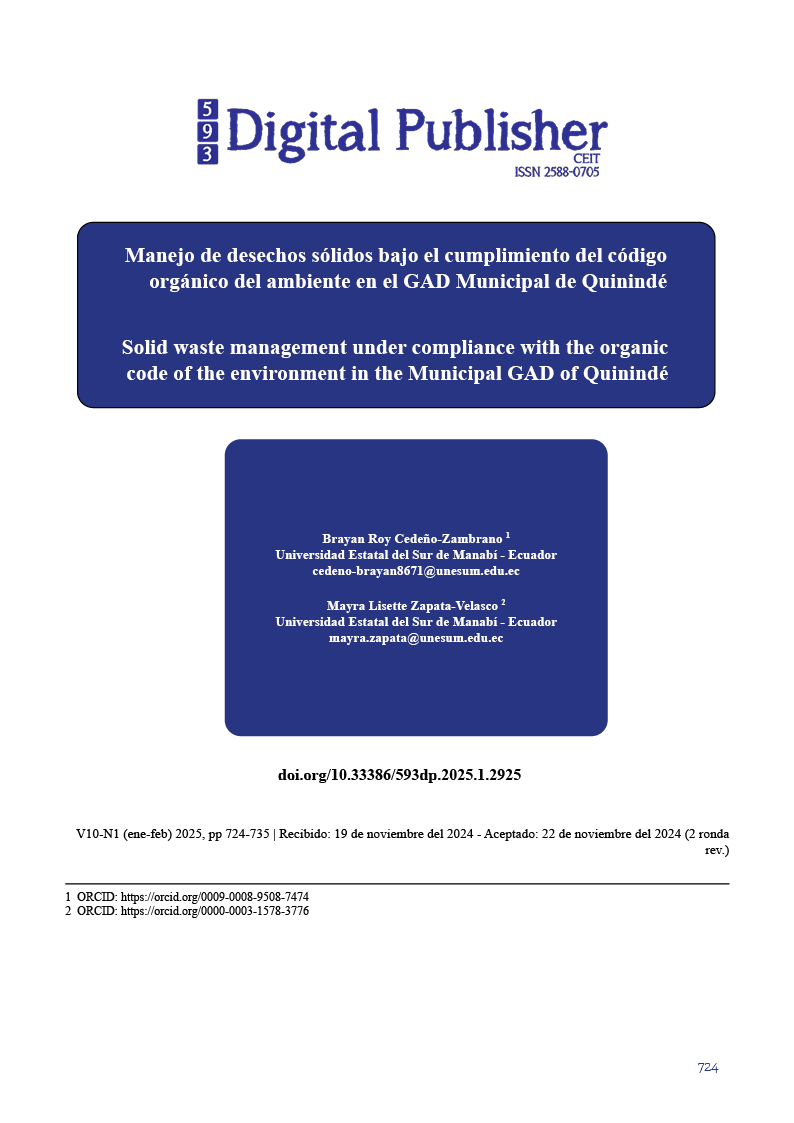Manejo de desechos sólidos bajo el cumplimiento del código orgánico del ambiente en el GAD Municipal de Quinindé
Contenido principal del artículo
Resumen
La gestión adecuada de los residuos sólidos sigue siendo un desafío global que afecta directamente la sostenibilidad ambiental, la salud pública y la calidad de vida. Este estudio tiene como objetivo identificar brechas en la investigación existente y proponer mejoras en las políticas y prácticas de manejo de residuos en el Gobierno Autónomo Descentralizado Municipal de Quinindé. A través de un enfoque cuantitativo explicativo, se recopilaron y analizaron datos mediante encuestas estructuradas aplicadas a una muestra estratificada de 75 participantes, incluidos operadores de residuos, funcionarios locales y residentes. Se garantizó el consentimiento informado y la confidencialidad de los datos, que se procesaron utilizando SPSS versión 25.0. Los resultados mostraron variabilidad en las percepciones comunitarias, resaltando áreas críticas como la necesidad de innovación y el fortalecimiento de las políticas públicas. El análisis de componentes principales y los modelos predictivos proporcionaron insights adicionales sobre la eficacia operativa y el impacto social de las prácticas de gestión de residuos. Se observó que la edad influía negativamente en la eficacia del manejo de residuos, lo que indica la importancia de adaptar las políticas a las características demográficas para optimizar las estrategias de gestión.
Descargas
Detalles del artículo

Esta obra está bajo una licencia internacional Creative Commons Atribución-NoComercial-CompartirIgual 4.0.
1. Derechos de autor
Las obras que se publican en 593 Digital Publisher CEIT están sujetas a los siguientes términos:
1.1. 593 Digital Publisher CEIT, conserva los derechos patrimoniales (copyright) de las obras publicadas, favorece y permite la reutilización de las mismas bajo la licencia Licencia Creative Commons 4.0 de Reconocimiento-NoComercial-CompartirIgual 4.0, por lo cual se pueden copiar, usar, difundir, transmitir y exponer públicamente, siempre que:
1.1.a. Se cite la autoría y fuente original de su publicación (revista, editorial, URL).
1.1.b. No se usen para fines comerciales u onerosos.
1.1.c. Se mencione la existencia y especificaciones de esta licencia de uso.
Citas
Abdel-Shafy, H. I., & Mansour, M. S. M. (2018). Solid waste issue: Sources, composition, disposal, recycling, and valorization. Egyptian Journal of Petroleum, 27(4), 1275–1290. https://doi.org/10.1016/j.ejpe.2018.07.003
Ahmad, S., Islam, T., Sadiq, M., & Kaleem, A. (2021). Promoting green behavior through ethical leadership: a model of green human resource management and environmental knowledge. Leadership & Organization Development Journal, 42(4), 531–547. https://doi.org/10.1108/LODJ-01-2020-0024
Bello, A. S., Al-Ghouti, M. A., & Abu-Dieyeh, M. H. (2022). Sustainable and long-term management of municipal solid waste: A review. Bioresource Technology Reports, 18, 101067. https://doi.org/10.1016/j.biteb.2022.101067
Bondarenko, V., Pokynchereda, V., Pidvalna, O., Kolesnyk, T., & Sokoliuk, S. (2023). Green Economy as a Prerequisite for Sustainable Development: Analysis of International and Ukrainian Experience. European Journal of Sustainable Development, 12(1), 221. https://doi.org/10.14207/ejsd.2023.v12n1p221
Brodhag, C., & Taliere, S. (2006). Sustainable development strategies: Tools for policy coherence. Natural Resources Forum, 30(2), 136–145. https://doi.org/10.1111/j.1477-8947.2006.00166.x
Código Orgánico Del Ambiente, Suplemento del Registro Oficial No. 983 (2017). https://municipiomera.gob.ec/Transparencia2022/CodigoAmbienteagosto2022.pdf
Collier, M. J., Nedović-Budić, Z., Aerts, J., Connop, S., Foley, D., Foley, K., Newport, D., McQuaid, S., Slaev, A., & Verburg, P. (2013). Transitioning to resilience and sustainability in urban communities. Cities, 32, S21–S28. https://doi.org/10.1016/j.cities.2013.03.010
Currell, K., & Jeukendrup, A. E. (2008). Validity, Reliability and Sensitivity of Measures of Sporting Performance. Sports Medicine, 38(4), 297–316. https://doi.org/10.2165/00007256-200838040-00003
Czaja, S. J., Charness, N., Fisk, A. D., Hertzog, C., Nair, S. N., Rogers, W. A., & Sharit, J. (2006). Factors predicting the use of technology: Findings from the center for research and education on aging and technology enhancement (create). Psychology and Aging, 21(2), 333–352. https://doi.org/10.1037/0882-7974.21.2.333
Esteves, A. M., Genus, A., Henfrey, T., Penha‐Lopes, G., & East, M. (2021). Sustainable entrepreneurship and the Sustainable Development Goals: Community‐led initiatives, the social solidarity economy and commons ecologies. Business Strategy and the Environment, 30(3), 1423–1435. https://doi.org/10.1002/bse.2706
Faure, M., & Niessen, N. (2006). Environmental Law in Development (M. Faure & N. Niessen, Eds.). Edward Elgar Publishing. https://doi.org/10.4337/9781847202918
Götz, O., Liehr-Gobbers, K., & Krafft, M. (2010). Evaluation of Structural Equation Models Using the Partial Least Squares (PLS) Approach. In Handbook of Partial Least Squares (pp. 691–711). Springer Berlin Heidelberg. https://doi.org/10.1007/978-3-540-32827-8_30
Heerink, M., Kröse, B., Evers, V., & Wielinga, B. (2010). Assessing Acceptance of Assistive Social Agent Technology by Older Adults: the Almere Model. International Journal of Social Robotics, 2(4), 361–375. https://doi.org/10.1007/s12369-010-0068-5
Howse, E., Crane, M., Hanigan, I., Gunn, L., Crosland, P., Ding, D., Hensher, M., & Rychetnik, L. (2021). Air pollution and the noncommunicable disease prevention agenda: opportunities for public health and environmental science. Environmental Research Letters, 16(6), 065002. https://doi.org/10.1088/1748-9326/abfba0
Koop, S. H. A., & van Leeuwen, C. J. (2017). The challenges of water, waste and climate change in cities. Environment, Development and Sustainability, 19(2), 385–418. https://doi.org/10.1007/s10668-016-9760-4
Lambin, E. F., & Meyfroidt, P. (2010). Land use transitions: Socio-ecological feedback versus socio-economic change. Land Use Policy, 27(2), 108–118. https://doi.org/10.1016/j.landusepol.2009.09.003
León Cuásquer, W. G. (2014). Gestión integrada de residuos sólidos en el recinto Simón Bolívar de la parroquia el reventador, Cantón Gonzalo Pizarro. [Tesis, Universidad Estatal Amazónica]. https://repositorio.uea.edu.ec/handle/123456789/149
Madaleno, M., & Nogueira, M. C. (2023). How Renewable Energy and CO2 Emissions Contribute to Economic Growth, and Sustainability—An Extensive Analysis. Sustainability, 15(5), 4089. https://doi.org/10.3390/su15054089
Marshall, R. E., & Farahbakhsh, K. (2013). Systems approaches to integrated solid waste management in developing countries. Waste Management, 33(4), 988–1003. https://doi.org/10.1016/j.wasman.2012.12.023
Martínez Hernández, J. J., Sánchez‐Medina, P. S., & Díaz‐Pichardo, R. (2021). Business‐oriented environmental regulation: Measurement and implications for environmental policy and business strategy from a sustainable development perspective. Business Strategy and the Environment, 30(1), 507–521. https://doi.org/10.1002/bse.2634
Morelli, X., Gabet, S., Rieux, C., Bouscasse, H., Mathy, S., & Slama, R. (2019). Which decreases in air pollution should be targeted to bring health and economic benefits and improve environmental justice? Environment International, 129, 538–550. https://doi.org/10.1016/j.envint.2019.04.077
Oztekin, C., Teksöz, G., Pamuk, S., Sahin, E., & Kilic, D. S. (2017). Gender perspective on the factors predicting recycling behavior: Implications from the theory of planned behavior. Waste Management, 62, 290–302. https://doi.org/10.1016/j.wasman.2016.12.036
Raghu, S. J., & Rodrigues, L. L. R. (2022). Solid waste management behavior among the student community: integrating environmental knowledge and situational factors into the theories of planned behavior and value belief norm. Journal of Environmental Planning and Management, 65(10), 1842–1874. https://doi.org/10.1080/09640568.2021.1949969
Reed, M. S. (2008). Stakeholder participation for environmental management: A literature review. Biological Conservation, 141(10), 2417–2431. https://doi.org/10.1016/j.biocon.2008.07.014
Rondón Toro, E., Szantó Narea, M., Pacheco, J. F., Contreras, E., & Gálvez, A. (2016). Guía general para la gestión de residuos sólidos domiciliarios. CEPAL.
Saseanu, A. S., Gogonea, R.-M., Ghita, S. I., & Zaharia, R. Ş. (2019). The Impact of Education and Residential Environment on Long-Term Waste Management Behavior in the Context of Sustainability. Sustainability, 11(14), 3775. https://doi.org/10.3390/su11143775
Sjåfjell, B., Mähönen, J. T., Johnston, A., & Cullen, J. (2019). Obstacles to Sustainable Global Business. Towards EU Policy Coherence for Sustainable Development. SSRN Electronic Journal. https://doi.org/10.2139/ssrn.3354401
Slack, R., Gronow, J., & Voulvulis, N. (2004). Hazardous Components of Household Waste. Critical Reviews in Environmental Science and Technology, 34(5), 419–445. https://doi.org/10.1080/10643380490443272
Stazi, V., & Tomei, M. C. (2018). Enhancing anaerobic treatment of domestic wastewater: State of the art, innovative technologies and future perspectives. Science of The Total Environment, 635, 78–91. https://doi.org/10.1016/j.scitotenv.2018.04.071
Tang, Y. M., Chau, K. Y., Fatima, A., & Waqas, M. (2022). Industry 4.0 technology and circular economy practices: business management strategies for environmental sustainability. Environmental Science and Pollution Research, 29(33), 49752–49769. https://doi.org/10.1007/s11356-022-19081-6
Ursachi, G., Horodnic, I. A., & Zait, A. (2015). How Reliable are Measurement Scales? External Factors with Indirect Influence on Reliability Estimators. Procedia Economics and Finance, 20, 679–686. https://doi.org/10.1016/S2212-5671(15)00123-9
Wainaina, S., Awasthi, M. K., Sarsaiya, S., Chen, H., Singh, E., Kumar, A., Ravindran, B., Awasthi, S. K., Liu, T., Duan, Y., Kumar, S., Zhang, Z., & Taherzadeh, M. J. (2020). Resource recovery and circular economy from organic solid waste using aerobic and anaerobic digestion technologies. Bioresource Technology, 301, 122778. https://doi.org/10.1016/j.biortech.2020.122778
Wu, H., Li, Y., Hao, Y., Ren, S., & Zhang, P. (2020). Environmental decentralization, local government competition, and regional green development: Evidence from China. Science of The Total Environment, 708, 135085. https://doi.org/10.1016/j.scitotenv.2019.135085
Wu, Y., Chau, K. W., Lu, W., Shen, L., Shuai, C., & Chen, J. (2018). Decoupling relationship between economic output and carbon emission in the Chinese construction industry. Environmental Impact Assessment Review, 71, 60–69. https://doi.org/10.1016/j.eiar.2018.04.001
Yang, C., & Arhonditsis, G. B. (2022). What are the primary covariates of environmental attitudes and behaviours in Canada? A national-scale analysis of socioeconomic, political, and demographic factors. Ecological Informatics, 69, 101661. https://doi.org/10.1016/j.ecoinf.2022.101661
Zurbrügg, C., Caniato, M., & Vaccari, M. (2014). How Assessment Methods Can Support Solid Waste Management in Developing Countries—A Critical Review. Sustainability, 6(2), 545–570. https://doi.org/10.3390/su6020545



